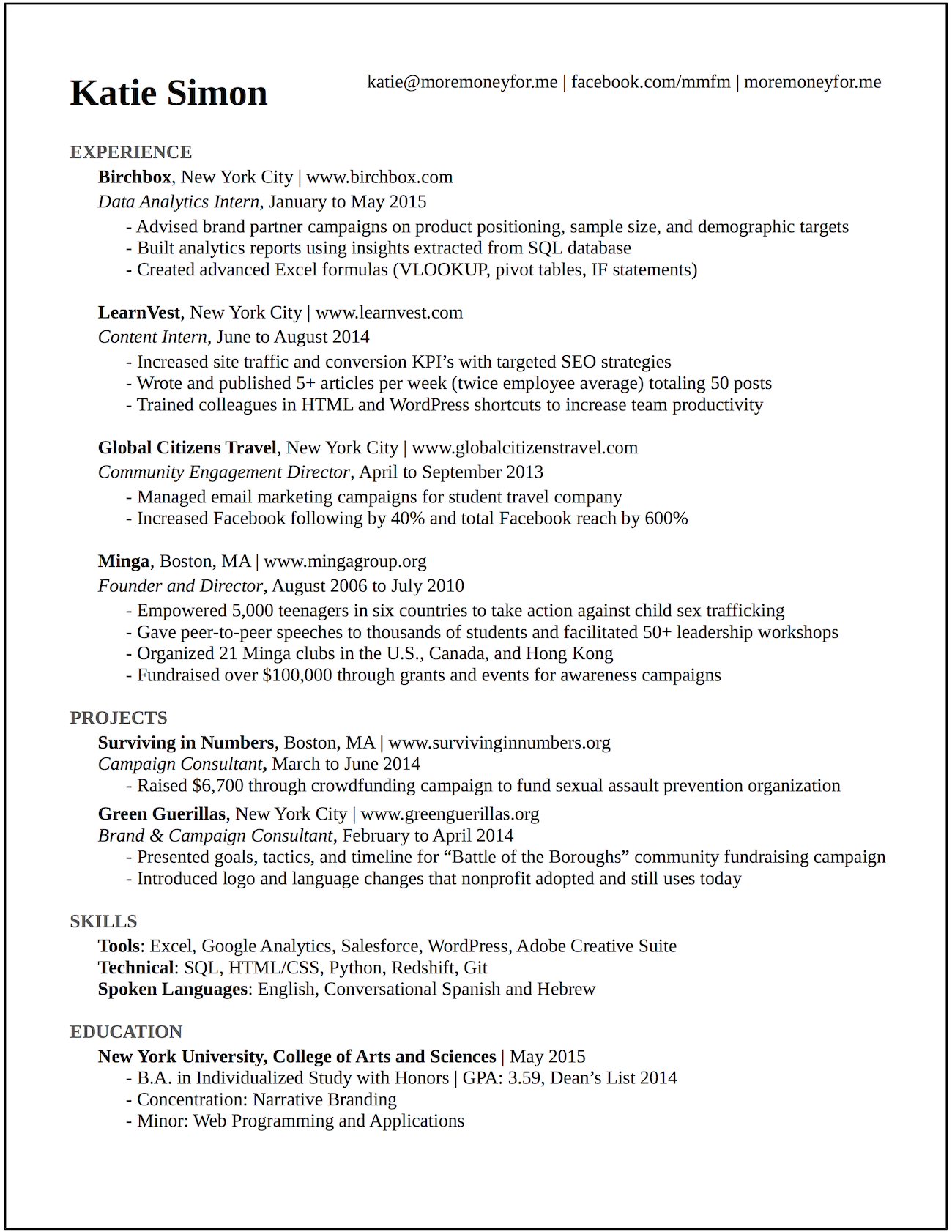This CV landed me interviews at Google and more than 20 top startups

Your support helps us to tell the story
From reproductive rights to climate change to Big Tech, The Independent is on the ground when the story is developing. Whether it's investigating the financials of Elon Musk's pro-Trump PAC or producing our latest documentary, 'The A Word', which shines a light on the American women fighting for reproductive rights, we know how important it is to parse out the facts from the messaging.
At such a critical moment in US history, we need reporters on the ground. Your donation allows us to keep sending journalists to speak to both sides of the story.
The Independent is trusted by Americans across the entire political spectrum. And unlike many other quality news outlets, we choose not to lock Americans out of our reporting and analysis with paywalls. We believe quality journalism should be available to everyone, paid for by those who can afford it.
Your support makes all the difference.During my senior year of college, I decided that I wasn't going to become another boomerang kid that moved back home, jobless and with no plan for after graduation.
I took on an extra internship, participated in extracurricular activities to expand my network, and made connections at job fairs.
I also crafted, revised, rewrote, and continuously edited my résumé.
This résumé landed me interviews at Google, BuzzFeed, Oscar, and nearly two dozen other top startups.

I also got interviews for full-time jobs at a major political campaign, a huge government contractor, and a billion-dollar foundation.
A résumé sounds pretty simple — write down your education, work experience, and a few extras and save it in a text file. Sure, this is technically a résumé. But after months (years, really) of working on my own, I've found a different approach to this living, breathing document.
- Think of your résumé as an outline for the job interview of your dreams. What questions do you want them to ask you? How do you want to impress them? What would you like to highlight, and what would you like to avoid bringing up? Assume that they have no other information about you besides this document. Is it compelling?
- Aim for clarity. Too many words = clutter = confusing = rejection. It doesn't matter how impressive you are if it's impossible to tell what's happening on the page. Fix this by eliminating all but the essentials. Cut ruthlessly both in terms of the type of information and sections you include, as well as the actual words and phrases you use. For every line, ask yourself: Will this improve how the company sees me?
- Be concise. Everything should fit comfortably on one page. Go for no more than three to four sub-sections for any given section, and no more than three bullets per sub-section — two is often plenty. Is that extra third bullet really adding much to the conversation? Keep each bullet to one line — this forces you to focus on the primary point you want to get across.
- Emphasize results first, then skills. For example, this is one of my bullets: “Increased Facebook following by 40% and total Facebook reach by 60%” instead of “Ran company's Facebook and Twitter accounts.” When possible, share the exact numbers. If you want to emphasize your skills or methods, you should still front-load the impact: “Increased site traffic and conversion KPIs with targeted SEO strategies” instead of “Used SEO strategies to boost site traffic.” Companies hire candidates who will give them results.
- Add a projects section. If you've made a big impact outside of work, whether through your sorority, for a class, or on your personal blog, be sure to share that. For a marketing class in college, I recommended branding changes to a nonprofit that they implemented and still use today — that's a big deal! Who cares if it was for a full-time job? Add that kind of thing as a project.
- Lead them to other sources of information about you. You can't fit everything about you on one piece of paper. If they want to learn more, make it easy! In the past I've included links to online writing portfolios, a personal website, my Github page, LinkedIn profile, Twitter handle, Instagram account, and photo blog. Make sure this is appropriate for your specific industry.
- Get rid of your oldest work experiences (probably). If you have more than three previous places of employment, considering dropping one or two of the oldest. I've worked at nearly twice as many places as I list on my résumé, but I opt to include only the ones that I know add a lot. Even if you don't have much professional experience, you may still consider excluding less impressive points. Remember that this is an outline for your dream interview. Do you want to split your time talking about delivering pizzas, or spend twice as much time talking about working in a research lab last summer?
- Include something weird. My brother got an open master's degree in Chairs and Sitting. It fits under his education section, demonstrates creativity and discipline, and makes him a more memorable candidate. You may run a YouTube channel about baking or win surfing competitions. Even if it's not particularly related to your job, consider adding a quirky “extra” that demonstrates positive attributes like entrepreneurship, imagination, or an ability to thrive under pressure.
- Tailor it to each employer. Yes, it takes time — but not that much time, especially if you keep a document with optional sections and bullet points to swap out. I have a list of about twice as many bullet points as I actually use. This way, if I'm applying for a more technical role, or a more writing-heavy one, I already have the material to swap out. This is especially useful if you're applying to jobs in more than one field or for more than one type of role.
Want me to take a look at your résumé and send you three easy, specific-to-you suggestions? There's no catch, and it takes about 30 seconds!
Katie Simon has been an entrepreneur since age 14 and a writer since she could hold a pen. She is the founder and chief consultant at More Money For Me, where she works with millennials to craft irresistible résumés and land dream job interviews. She holds a BA in narrative branding from New York University, and her work has appeared on sites including Refinery29, Health.com, Elite Daily, and Huffington Post.
Read more:
• This chart is easy to interpret: It says we're screwed
• How Uber became the world's most valuable startup
• These 4 things could trigger the next crisis in Europe
Read the original article on Business Insider UK. © 2016. Follow Business Insider UK on Twitter.
Join our commenting forum
Join thought-provoking conversations, follow other Independent readers and see their replies
Comments